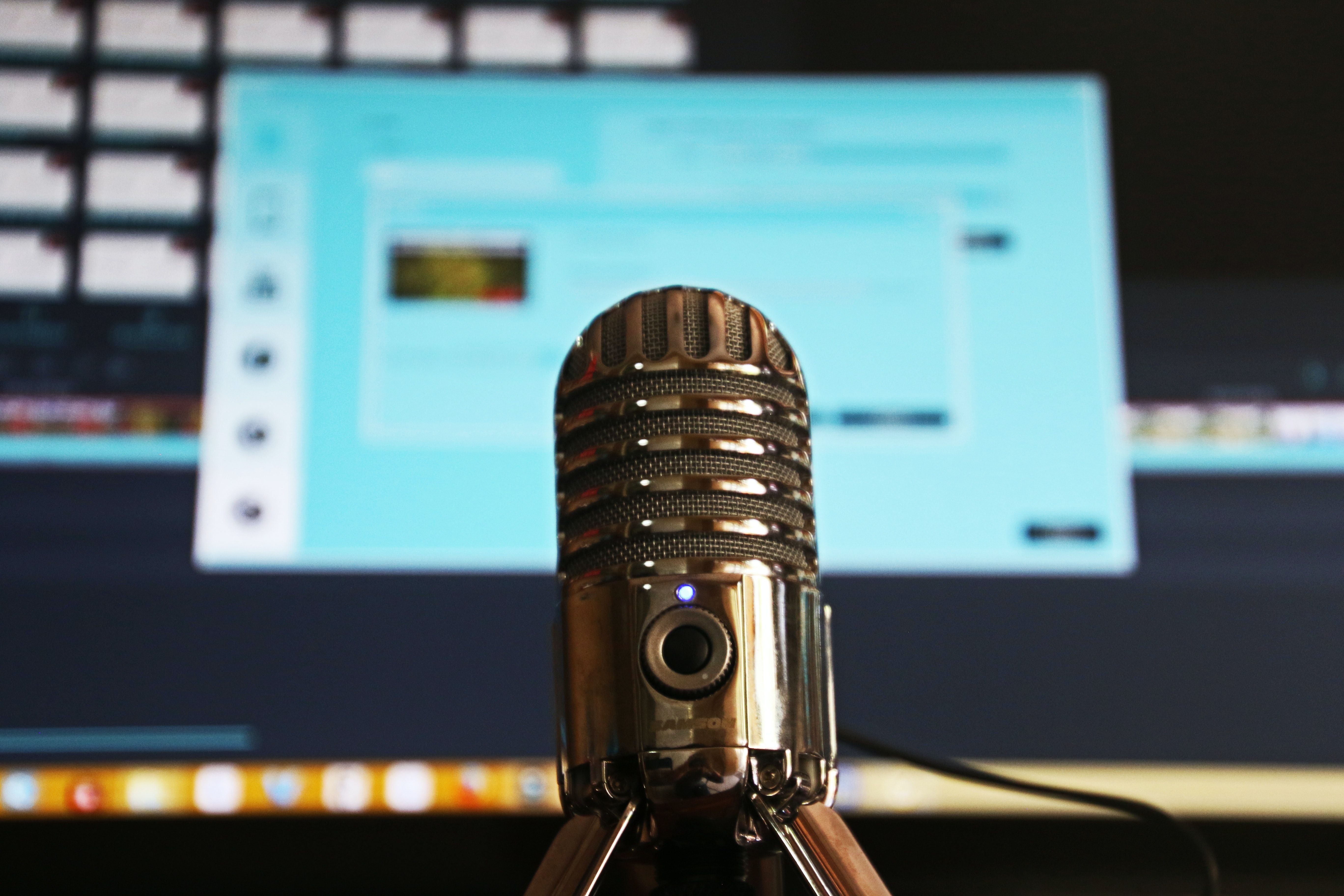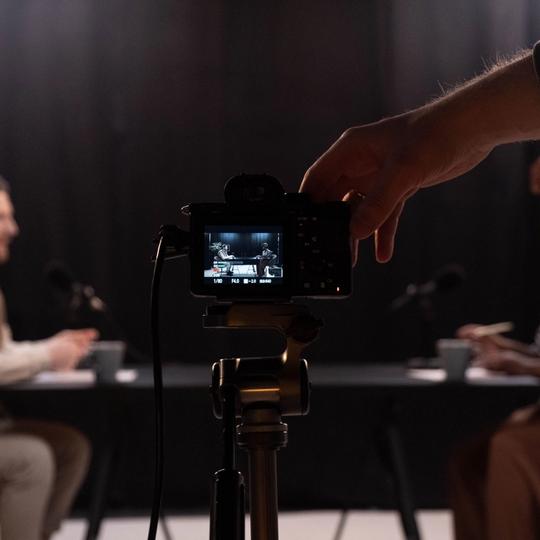
Alyciah Beavers
14-September-23
Ready to drop some pod magic? Our guide helps you nail the vibe, choose your style, and create podcasting gold. Let's roll those microphones!
In the ever-evolving digital media landscape, podcasting is emerging as a dynamic and influential platform for content creators to engage with audiences on a global scale. With thousands of podcasts available across various genres, finding your unique voice and style is essential to stand out in this crowded space. One of the critical decisions a podcaster must make is choosing the proper podcast format for their show.
Whether you're a seasoned podcaster looking to refresh your approach or a newcomer eager to make a memorable debut, understanding the significance of podcast formats is the first step toward crafting a compelling and successful podcast.
Your format determines the structure, tone, and experience you offer your listeners. In this guide, we will delve into the intricacies of selecting the perfect podcast format to suit your content, goals, and audience, helping you embark on a journey to create a podcast that resonates and captivates.
So, let's dive in and explore how to navigate the vast landscape of podcasting formats to find the one that best suits your vision and goals.
What Does a Podcast Format Mean?
It refers to the different ways of organizing your show’s content before posting it on various streaming platforms. Some delivery methods give you better structure than others; without the proper format, getting in touch with your target audience is impossible. A weak podcast format seems messy and disjoined, which can make the potential target audience disconnect from your content.
The correct format creates consistency for your audience. Therefore, sticking to one podcast format means the listeners already know what to expect from you with every new episode. The ideal format also makes it easy for your listeners to recommend your show to their friends, making it easier for you to plan what to talk about every day.
Types of Podcast Formats
Podcasts come in various formats, and content creators often choose a format that suits their niche and style. Below are the common podcast formats:
1. Interviews
The hosts interview guests, often experts or individuals with interesting stories in this format. These can be long-form or short-form interviews. In this format, the host or hosts converse with different guests during each episode. It could be questions regarding their work, perception towards life, or educative matters such as climate change and equal rights for the LQBTQIA2S+.
Pros
- Once you steer the conversation, your guests will do the most talking.
- Listeners are forgiving if the guests use a lot of filler words like “um,” “hmm,” and “ah” since they understand that you are having a real conversation.
- It opens your show to a new audience based on the topic.
Cons
- The format is popular, making it hard for you to stand out.
- You constantly have to research well on the types of guests you are bringing on board to understand their niche.
- It takes a lot of work to find new guests for every episode.
- Gaining the right interviewing skills is challenging and takes time and lots of practice.
2. Conversational Podcast
A conversational podcast involves hosts discussing various topics, often with a casual and unscripted feel. It's like eavesdropping on a friendly conversation. It feels like an informal discussion among friends, and many podcasters prefer this format if they constantly talk about celebrities.
Hosts can choose many topics, including crime documentaries, politics, money, and sports. In this conversation, the host plays different roles during the show, and unlike the interview podcast, the conversation format means that the two or more people on the show are all hosts.
Pros
- Getting listeners looking for organic content rather than interviews or a prepared script is easy.
- The fans feel like they are part of the group and easily connect with the hosts since they listen to their friends’ stories.
- As the host, you are responsible for most of the conversation.
Cons
- You should be on the same page with your host on what to discuss during every topic.
- Sometimes, you have to discuss topics that you barely have a clue about and have to research properly on them.
- Every episode relies on a conversation, and you cannot script it as much since it is bound to go off-topic with the scripting.
3. Solo
In solo podcasts, the host or hosts speak directly to the audience without guests. This format is suitable for delivering monologues, stories, or educational content. It is an ideal format if you are confident about your speaking skills and looking for ways to form authentic bonds with your target audience. You will also encourage the listeners to write some questions to you, comments, and reactions to your show, thus creating an interactive and intimate podcast experience.
Pros
- You have the final say in what content cuts.
- It is a chance to build a great relationship with your audience.
- Since you do not have to schedule the recording around anyone, you can create a new episode at your convenience.
Cons
- There is no one else to carry the conversation but you.
- You will have to do the editing work unless you hire some professional editors.
4. Panel Discussion
The format has multiple experts discussing a particular topic or issue. This format provides different perspectives and insights. It is similar to the interview format, only that this one has more guests. It is a great format to take the heat off the host and provides a more interactive and collaborative environment.
Pros
- You will not experience pressure when hosting a panel discussion since the guest will keep the show interactive.
- Every topic is unique and filled with insightful conversations and interesting opinions.
Cons
- It requires extra work to control the panel, especially if the group is huge.
- You will need to coordinate each of your guests' schedules and accommodate them when planning for your show’s recording.
5. Storytelling Podcast
Storytelling podcasts are non-fictitious shows that the hosts produce based on real-life events. They often feature immersive storytelling, sound effects, and music to engage the audience. Sometimes, you will dive into some incredible events, such as conquering Mount Everest, while in other episodes, you focus on a historical event.
Pros
- It is an addictive format, especially for individuals interested in specific topics, allowing you to gain more listeners.
- You have a lot of choices to choose from when looking for the next topic to discuss.
- It allows you to spice things up by adding different sounds, such as movie clips or other sound effects, to make the show interesting.
Cons
- It is challenging to do it solo.
- The research is laborious and time-consuming when searching for content.
- Sticking to a specific publishing schedule is impossible since some episodes take longer to produce than others.
6. Educational or Instructional
These podcasts aim to educate the audience on topics such as science, history, technology, or self-improvement. An educational podcast is similar to a conversational or interview podcast. Still, it focuses on teaching its audience a specific topic, such as improving your painting skills or growing your business.
Pros
- Provides high-value information that keeps your audience coming back for more.
- It gives you a chance to develop some authority in a niche.
Cons
- Some topics are impossible to teach without visual elements.
7. Fiction
Like narrative podcasts, fiction or podcast theatre features fictional stories with voice actors, sound effects, and music, creating a theatrical experience for the listeners. There will be different fictional episodes where a single or multiple voice actors narrate the stories. These shows use climax, tension, and cliffhangers when telling the story.
Pros
- You have a chance to make up a story without worrying about facts.
- There is little competition since not many people do it.
- This is an opportunity to get regular listeners as they want to understand what happens next in each story.
Cons
- It is a challenging format for uncreative individuals.
- You have to plan the season since the episodes are related.
- Since it is an unusual format, it might take time to build the right audience.
How to Choose the Correct Format
1. Define Your Podcast's Purpose and Niche
Determine the primary purpose of your podcast. Are you educating, entertaining, inspiring, or informing your audience? Identify your target audience and niche. Who are you creating content for, and what topics or interests will you cover?
2. Research Your Competitors
Listen to other podcasts in your niche to see what popular formats and gaps exist. Look at the competitors' strengths and weaknesses to differentiate your podcast.
3. Consider Your Expertise and Passion
Choose a format that aligns with your expertise, interests, and passion. Creating compelling content is easier when you're genuinely enthusiastic about the subject.
4. Evaluate Potential Podcast Formats
Various podcast formats include interviews, solo, co-hosted, panel, story-telling, and more. Look at each of them, paying attention to their pros and cons and determining which format is suitable for your podcast.
5. Consider Your Resources and Schedule
Think about your available time, budget, and equipment. Some formats may require more preparation and editing than others. Always choose a format that aligns with your preferred production schedule. Some formats, like daily news updates, demand frequent content creation.
6. Plan Episode Structure
Outline the structure of your episodes. Determine how long they'll be, whether they'll include segments, and if there's a consistent opening and closing routine.
7. Flexibility and Evolution
Be open to evolving your format based on audience feedback and changing trends over time. Remember that the world is moving pretty fast, with technology changing occasionally. You should also create a brand and constantly update your content.
Ensure your chosen format aligns with your podcast's branding and messaging. Additionally, maintain consistency regarding episode length, release schedule, and content quality.
Pick the Proper Format Today
Podcasts are a great way of making some income. It does not matter if you are getting into this business for the first time, as there is an ideal podcast format just for you!
Select a format that aligns with your brand and matches your style. Your podcast format significantly impacts your show; therefore, choose wisely. Check out our professional podcasting services, as we can assist you in selecting the ideal podcast format.


